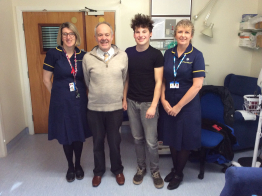
TrialNet screening is unavailable to residents of the United Kingdom. Please contact trialnet-uk@bristol.ac.uk for more information.
Led by Yuk Fun-Liu, MD, the TrialNet team at University of Bristol is dedicated to preventing type 1 diabetes and stopping disease progression by preserving insulin production before and after diagnosis.
Our Team

Yuk-Fun Liu, MD

Beth Thorne
Clinical Trials Programme Manager
Samantha Loud
Paediatric Research Nurse
Pilar Munoz
Administrator
Tracey Hughes
Research Assistant PractitionerRegional Affiliates
Affiliates provide opportunities for people who do not live near a TrialNet Clinical Center. The affiliate sites listed below work with University of Bristol to offer convenient participation in our research programs
Research Studies
Depending on your risk screening results, you may be eligible for monitoring. We’ll monitor you for disease progression and let you know if you become eligible for a study. More
TrialNet tested the drug abatacept to see if it could delay or prevent stage 1 T1D (two or more diabetes-related autoantibodies, but normal blood sugar) from progressing to stage 2 (abnormal blood sugar) or to stage 3 (clinical diagnosis). In an earlier study in people newly diagnosed (stage 3), participants treated with abatacept had 59% better insulin production and a 9.6-month average delay in progression of insulin loss compared to those who received placebo. That difference extended out to 3 years. Details
We are testing the drug hydroxychloroquine (HCQ) to see if it can delay or prevent early stage T1D (stage 1) from progressing to abnormal glucose tolerance (stage 2) and ultimately prevent clinical diagnosis (stage 3). HCQ is already used to reduce symptoms and progression of other autoimmune diseases, such as rheumatoid arthritis and lupus. This is the first study to see if it can prevent or delay T1D. Details
If you are diagnosed with T1D while participating in one of our prevention studies, we’re still here for you. You can continue to receive personal monitoring while helping us learn more. More






